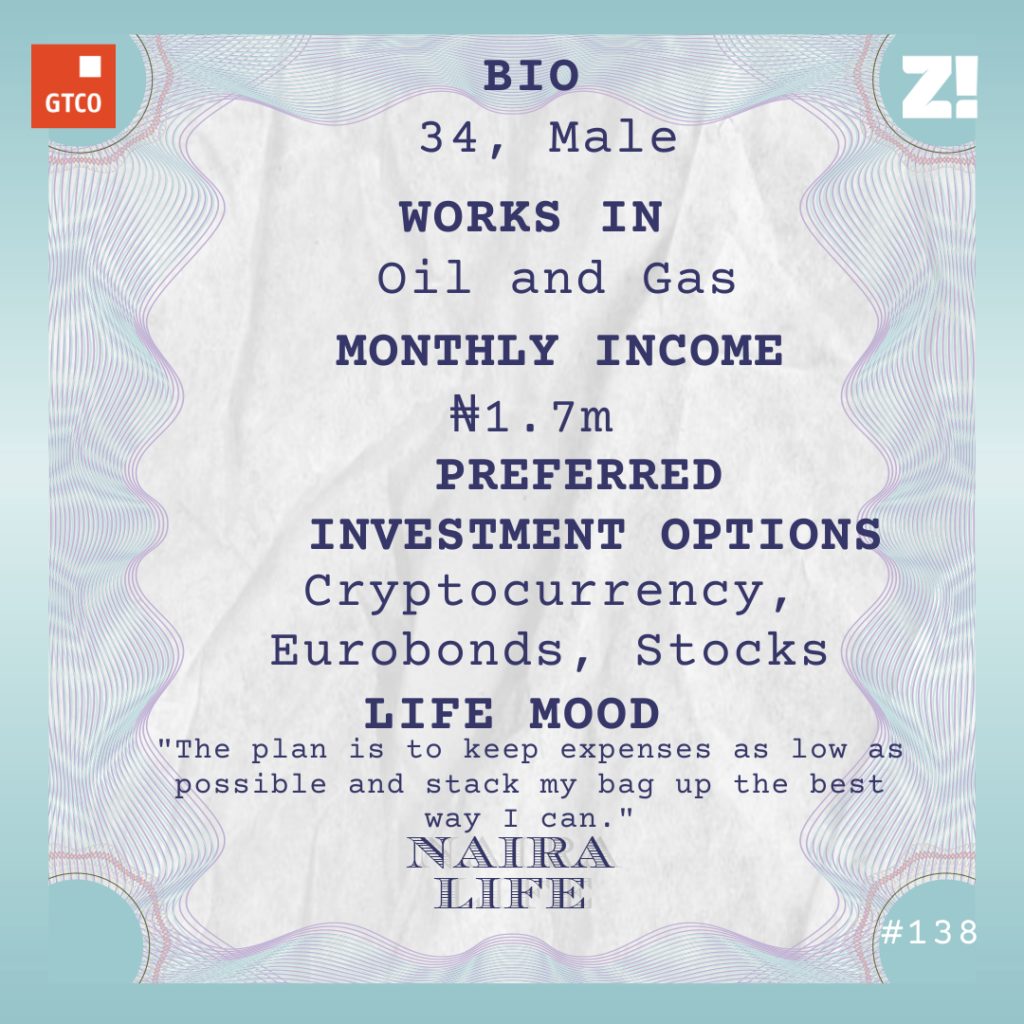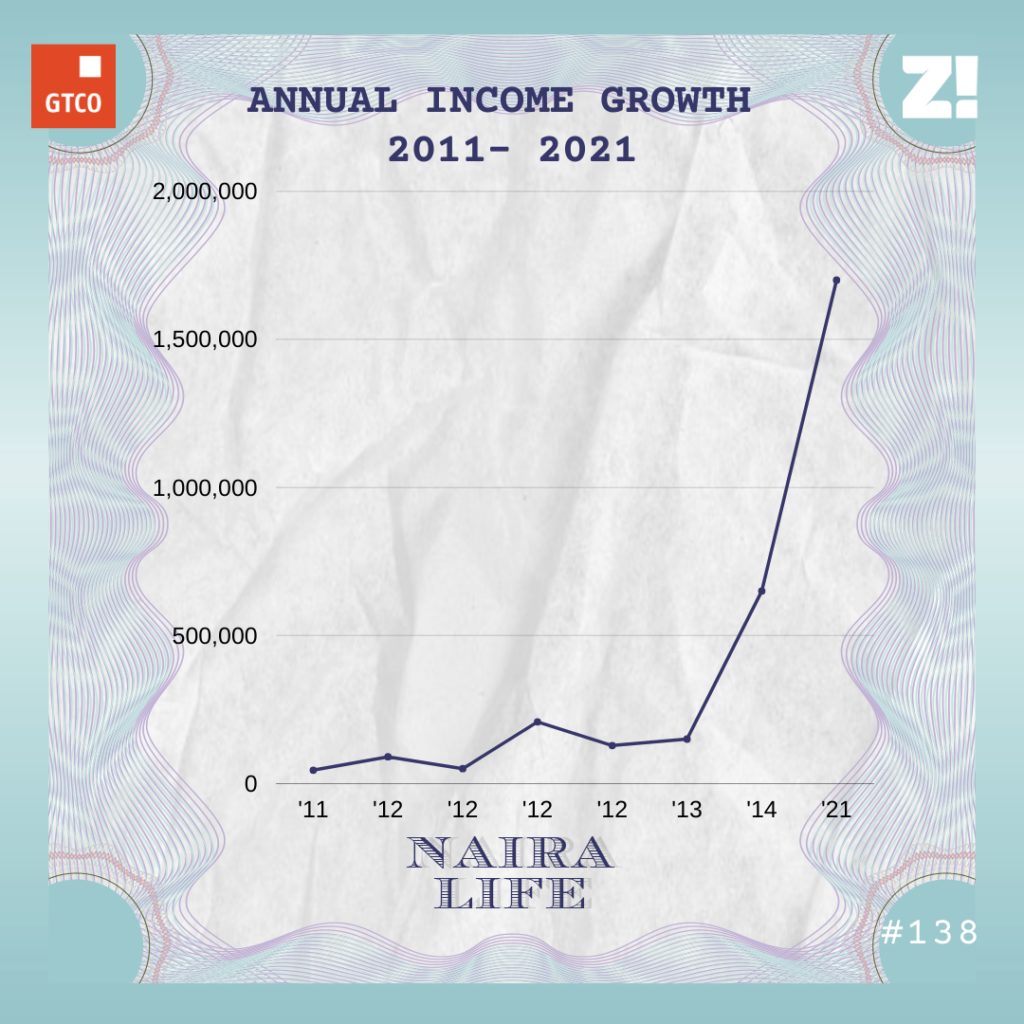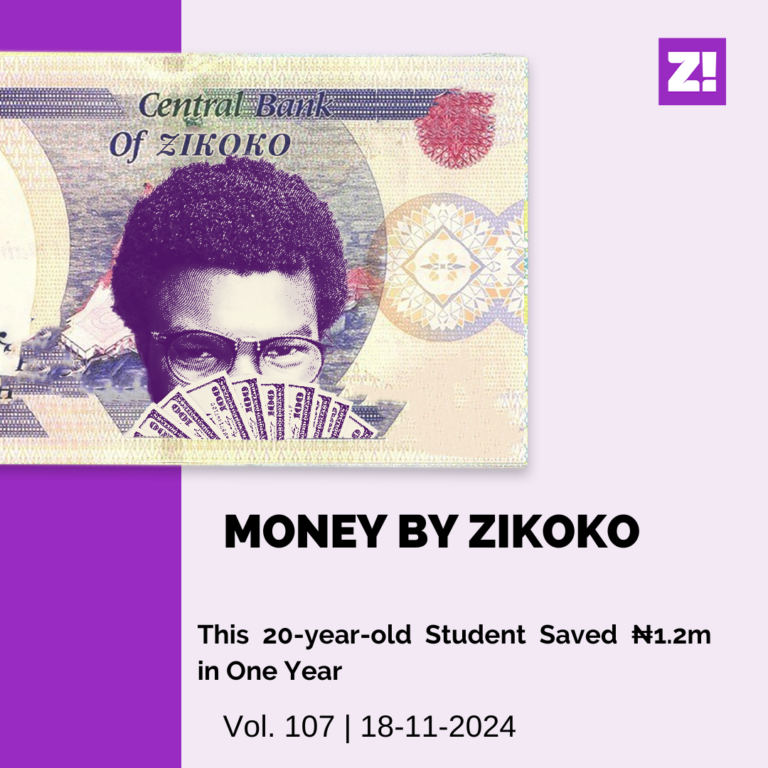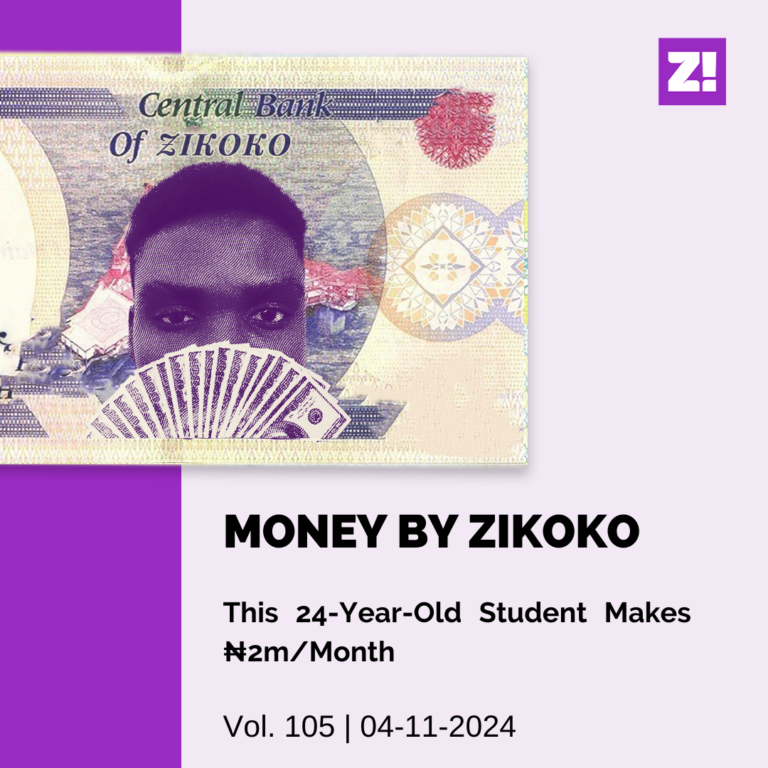Every week, Zikoko seeks to understand how people move the Naira in and out of their lives. Some stories will be struggle-ish, others will be bougie. All the time, it’ll be revealing.
This week’s Naira Life is brought to you by QuickCredit. With QuickCredit, you not only get the funds you need instantly, but you also get to pay back at the lowest interest rate in Nigeria.

The 34-year-old engineer in this #NairaLife made a career switch into oil and gas in 2014. Since that time, his basic salary has grown to ₦1.7m/month. Now, he wants to retire in six years with $1m in liquid assets. How does he hope to get there?

What’s your oldest memory of money?
My parents worked in the civil service and most of the people I grew up with were in a similar economic class, so I didn’t think there were rich people or poor people. I went to a government-owned school for my first three years of secondary school before switching to a private school for my senior secondary education in 2001. There, I learnt of my social standing. The first thing I noticed was that my school fees jumped from ₦200 to ₦14k per term.
My allowance was ₦50, which was little compared to what others had. What this meant for me was that I had to save for days to afford things some of my classmates could buy in an afternoon.
There was also some anxiety that came with this discovery. I avoided school parties as much as I could because I didn’t think I had the right clothes or shoes to wear. My three years at the school made it clear I had to make money in the future to bridge the gap.
Did you do anything for money during this time?
No, not really. I may have done one or two things for my family that fetched me money, but that wasn’t my objective and they were also far and in-between.
I left secondary school in 2003 and enrolled for my A-Levels programme, and the tuition was ₦100k. This experience was also a reality check. While there were people who were taking the classes and writing the exam to apply to schools abroad, there was me who knew I was going to a university in Nigeria. I didn’t even finish the programme.
Oh, why not?
I applied for and got into a diploma programme at a university in the southwest before the year ended, so I decided to go for it. It cost ₦210k, and my parents took a loan from their cooperative society to pay for it. A year later, I was offered provisional admission to study electrical engineering at the same university.
How did uni go?
I lived mostly on the allowance I got from my parents. It was ₦5k and came once a month. I also had family friends in the city I was studying in and got some money from them at intervals too. However, I wasn’t saving or keeping money aside because it was barely enough. But I survived university and won’t say I had a tough time with money. I graduated in 2009.
I was mobilised for NYSC in June 2010 and posted to a state in the south-south. I worked in a secondary school owned by the state government. I lived on less than ₦13k/month for the entire year — the federal government paid ₦9,775 and the state government paid ₦3k. Luckily, food was also ridiculously cheap in the village I was posted to. I could make a pot of soup with about ₦320. I wasn’t exactly saving because I wasn’t earning enough, but by the end of my service year, I had about ₦50k in my savings account.
How?
The 2011 election was the game-changer. I worked as an ad-hoc staff for INEC during the voter registration exercise and got about ₦30k from it. I also got about the same amount of money from working during the general election.
This wasn’t the last sum of money I made off NYSC.
I’m listening.
After my service year, the federal government increased the allowance from ₦9775 to ₦19,800. My batch was eligible to receive payment arrears. I think they paid about six months arrears, which was good money to me, especially considering that I was at home and without a job.
Man, how long were you unemployed?
About three months. I got my first job in September 2011, as an engineer in an authorised repair centre for Nokia phones. My salary was ₦45k, which I thought was decent. I spent only four months there though.
Why did you leave?
One of my mum’s friends had a son who worked with a contractor that handled marketing for Nokia phones in Nigeria, and I was encouraged to apply for a job there. I did, and I got the job. Nokia was a flagship phone at the time, so there were lots of roles. I was hired as an in-store experience marketer. I was posted to a phone store to serve as a Nokia representative and market the phones to potential buyers. The job paid ₦90k.
That was twice what you earned as a phone engineer.
Yes, it was. At the end of my first month there, they transferred me to a North-central state, which was a bit of an inconvenience. There were no accommodation arrangements, and I had to figure that out myself. Guess what happened on the first night I got to my new station?
What?
I got a text from a bank I had applied to months earlier, inviting me to come for medicals. Man, I jumped on the first bus the following morning and left the town. I sent in my resignation on the same day.
I had to go to the bank’s training school first. This started in February 2012 and lasted for four months. They paid trainees ₦50k. However, my time at the training school was some of the best of my life. Unfortunately, my time as a confirmed staff of the bank wasn’t half as pleasant.
Why not?
Let me start with the good: I got a raise when I was absorbed into the bank’s workforce and my salary jumped to ₦208k. Subsequently, I was posted to the marketing department and had to find new customers for the bank. My department had an annual target of ₦4bn, and this was a drag on my life. In between finding new customers and retaining existing customers, my quality of life took a dip. At the height of it, my job satisfaction was low but the money was decent. Everything only made sense when my salary came in at the end of the month.
Thankfully, two months after I started work as a full-staff, a consulting company I had applied to months earlier reached out, inviting me to the final round of interviews. I got an offer letter from them in August 2012.
How much?
₦128k. Another pay cut, but I was only too happy to accept it. I was like, “If I’m not going to chase customers, pay me whatever you want.”
Haha. Fair enough.
After my induction, I was posted to management consulting. After my first year, my salary was increased to ₦150k. This was also around the time I delved into my first side hustle.
Tell me about that.
I started saving ₦50k from my salary every month because I wanted to buy a car. I saved ₦400k in eight months. One of my friends had an uncle who did Cotonou runs and shipped cars into Nigeria. We went to Cotonou together, but my ₦400k couldn’t buy me any of the cars I wanted. The best deal I got that was within my budget was a 1993 Toyota Camry, and they were going to sell it for ₦600k.
I eventually bought a 2001 Mazda, and it cost ₦700k. Two of my friends loaned me ₦150k each to buy the car. But the trip opened my eyes to the possibilities of shipping cars in and selling them in the country. The opportunity to act on this came a few months later when a friend wanted to buy a car and I told him I’d handle it. I went to Cotonou myself and brought the car in. On that trip alone, I made ₦75k in profit. For context, I was earning ₦150k per month.
You made half your monthly salary in a day.
Exactly. Omo, I started telling everybody I knew that I was selling cars. When this side business caught on, I was doing an average of two trips per month and making between ₦50k and ₦75k on each trip.
Interesting. How was it going with your day job?
I was now in my second year at the consulting company. One day, a former colleague who had left for an oil company called me and informed me that his company was recruiting. I didn’t put a lot of thought into it, but I applied and went through the entire process. I got an offer to start work in May 2014.
Whoop!
My basic salary was ₦650k, minus allowances. It would take me about six years to hit that number at the consulting company I was with. It was an easy decision.
I was hired as an instrumentation engineer. Basically, we automate the process used in bringing out oil and gas from the sub-surface.
The first payment I received from the company was an accommodation allowance. ₦22k per day for 90 days. And guess what? They paid everything at once. ₦1.98m landed in my account, and I hadn’t even done any work. It was the biggest lump sum payment I had ever received up until that point.
Subsequently, I was put on a trainee programme, moving around different on-shore facilities to work and learn about the job. Mostly, I was working for two weeks and taking the following two weeks off. My basic salary was ₦650k, but there was also some form of allowance payment every month. On average. I was earning up to ₦1m every month as a trainee.
Baller.
I also saw an opportunity for my side business there. I told everyone I could that I sold cars, and the orders came in. They had a higher purchasing power than the guys at my former workplace, so they went for higher-end cars — mostly vehicles around the region of ₦4m – ₦5m. My profit on these deals were about ₦1m.
Interesting.
I graduated from my trainee programme in 2017 and was transferred to my first facility. I got a raise and started earning ₦1.2m. The constant allowance I remember from that time was my accommodation allowance. The facility I was working out of didn’t have great accommodation options, so the company paid me ₦250k every two weeks to make up for that.
And how has your salary evolved since that time?
My salary has increased by at least 5% every year. At the moment, I earn ₦1.7m/month. But there are also a couple of allowances and bonus payments that come in during the course of the year. Everything I earn, including bonuses, stacks up to ₦25m – ₦30m per annum.

On the side, I invest heavily in cryptocurrency.
How did you get into crypto?
I grew out of the car business, so I started looking for something else I could do. I became interested in crypto in the early parts of 2020. I finally took the plunge in July when I bought one bitcoin for ₦4.5m. By the time I sold it, it was ₦4.9m. I made a profit of ₦400k on one trade.
Information is important when dealing with cryptocurrency, so I subscribed to every crypto subreddit I could find. And started doubling on my investments as much as I could. The more I got into crypto, the more I saw the possibilities. It’s been a game-changer, and it’s part of my retirement plan.
What’s your retirement plan?
I want to retire at 40 with $1m in liquid assets. I’ve decided that crypto could get me there, so it’s pretty much my side hustle now. At the height of the bull run earlier this year, I had about $210k in my portfolio. But the dip happened and I held on. The last time I checked, I had $90k, and I’m building it back up.
Man, how do you decide what coins to bet on?
Research. I do a lot of technical and fundamental analysis. With the fundamental analysis, I look at the coin, what problem it solves, and who the backers are. I’m not good at technical analysis, so I follow a lot of people who are. I look at their research and decide whether to invest in a coin or not.
I know cryptocurrency is volatile, so I’m not putting all my hopes on it.
What are your other investments?
I started investing in Eurobonds in 2018. I started with about $20k, and the ROI is 12% per annum. When Covid hit last year, I wanted to put more money in it, so I took a loan of ₦14m from work and topped the account up at ₦440/$1. The total value of my Eurobond investment now is about $60k.
There’s also my company stock. Employees get a 15% employee discount, and I’ve been putting some of the money I get into that too. My stock in the company is currently valued at $30k.
I have some landed properties in two states in the country, but I don’t put a lot of thought into this. I believe landed properties are not the best investment choice in Nigeria — inflation eats at every profit you can ever hope to make. But I have a 3-bedroom project I’ve been working on since 2014 and is valued at ₦40m and another piece of land that’s worth ₦8m.
All of this should bring my total investments across my portfolios to at least $180k.
That’s impressive. Let’s talk about your monthly running costs. What do they look like?

I’m not married, but I have a live-in partner and we have two kids together, hence the housekeeping expenses. I took a loan from work last year to invest in Eurobond, and it’s spread over four years. I’m not mad about it — I’m repaying the loan in naira and earning my ROI in dollars.
I also don’t save or invest in naira anymore. When I get paid at the end of the month, I take out my monthly running costs, convert the rest into dollars and put it into my range of investment.
I really want to know how your perspective about money has changed over the years.
It has largely remained the same — money is a tool to get things. I acknowledge that and also understand that I need to stay hungry to make more.
Also, I don’t feel validation from owning things or splashing money on things I don’t need. I currently drive a 2004 European model car I bought for ₦1.5m. My annual rent is ₦500k. The plan is to keep expenses as low as possible and stack my bag up the best way I can. I’ve learned that money is like working out to grow muscles — you don’t get what you want in a day, so intentionality is key.
Looking at where you are in your career, how much do you feel like you should be earning?
For starters, I don’t feel underpaid. The next role I’m going into in my place of work should see my salary grow to ₦1.8m – ₦2m/month. I feel like I’m right where I should be.
Great. Is there anything you want but can’t afford then?
A Tesla maybe. I don’t think I can’t afford it, but it wouldn’t make sense to buy it when I’m living in Nigeria.
What about something you bought recently that required some planning?
I used my last phone — a OnePlus — for five years. The newest model came out earlier this year and I just decided to go for it. It cost me $1054. It didn’t require a lot of planning; I just had to think about it for a bit before I liquidated some of my investments in crypto.
I’m curious, when was the last time you felt really broke?
I can’t remember. I feel like I’m broke when the money in my account goes below ₦100k, and this hasn’t happened in a hot minute. Also, I know some money is available if I need to access it. I try as much as possible not to do it, but I could liquidate some of my assets if I badly need money. There’s some sense of security that comes with that.
On a scale of 1-10, how would you rate your financial happiness?
8. There’s no great need in front of me that I can’t afford. I’m also excited about my potential earnings and the strategy I’m putting in place to hit them. Life couldn’t be better, really. If I hit my $1m target by 40, this might increase to a 10.
Great! You got to the end of this article. Know what’s even better? You can get QuickCredit faster than the time it took you to read this article. With Quickcredit, GTBank customers can get N2million in less than 2 minutes and pay back over 12 months at an interest rate of 1.5%. No forms. No collateral. No hidden charges. Get Your Quick Credit on GTWorld





